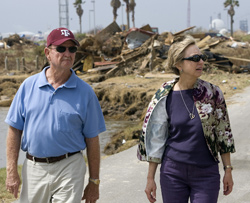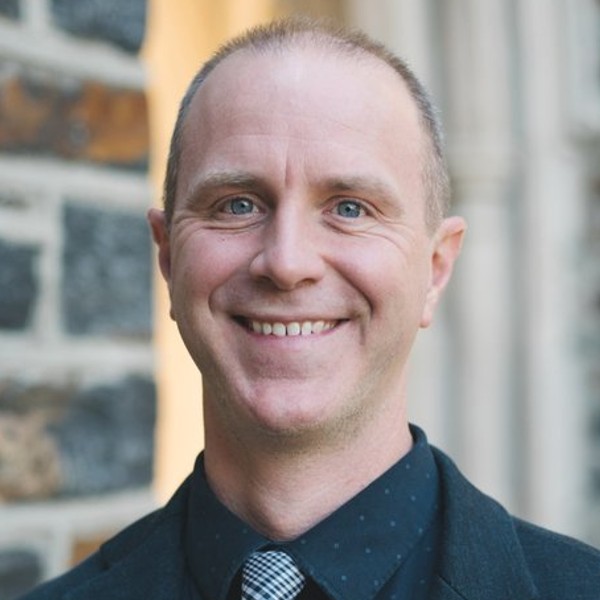After Hurricane Ike hit the Texas Gulf Coast in September 2008, Bishop Janice Riggle Huie visited United Methodist Churches throughout the region, assessing damage and rallying clergy and laity. The storm, one of the largest natural disasters in Texas history, killed 48 people in the state, caused more than $27 billion in property damage and left millions of people without electricity and other utilities.
The victims included more than 100 UMC churches and parsonages in the Texas Annual Conference. In Bridge City, a town of 8,600 near the Texas-Louisiana border, the storm surge flooded almost every home. At St. Paul UMC, only four of 42 families were spared from the flooding. Hurricane Rita had destroyed the old sanctuary three years earlier. Now, the new concrete slab for a new sanctuary was covered in a thick layer of mud, storm debris and dead fish.
“They were finally getting a new start and then Ike hit,” Huie said. “And this was worse than the first time. I wanted to fix things and make it better, but I felt as though I had run into the limits of my abilities. Who was going to help?”
Huie felt overwhelmed and alone -- and not for the first time in her ministry. The damage left by Ike’s 110-mile-an-hour winds only intensified what she had learned, first as a pastor, then a district superintendent, and for the past 12 years as a bishop: leadership can be a lonely and isolating experience.
“As much as anything, loneliness and isolation can come from the needs that are placed on you,” she said. “It’s like the five loaves and two fishes: Sometimes, there are just so many needs and so little to offer. And that’s true whether I’m dealing with recovery after a hurricane or just the day-to-day work.”
Questions to consider
Questions to consider:
- How do leaders avoid thinking they must “fix” people or situations?
- What might change if leaders saw challenges through a communal lens instead of an individual lens?
- What biblical stories and theological wisdom counter the idea that leaders are isolated problem-solvers?
- Can organizational structures foster -- or diminish -- loneliness?
The higher you go, the greater the risk
Huie has it right, said Russ S. Moxley, a writer, consultant and trainer on leadership. Whether in the church, business, or any other field, leadership -- particularly for those in executive positions -- can be inherently isolating. The higher you go, the greater the risk of isolation.
“It’s a very real issue,” said Moxley, a former senior fellow with the Center for Creative Leadership in Greensboro, N.C., who is facilitating the Leadership Education program Foundations of Christian Leadership. “As people move up any organizational ladder, the closer they get to the top, the easier it is to become isolated and alone.”
Many factors can play a role in making it lonely at the top. As people are promoted to new positions, they have fewer colleagues even as their burdens and responsibilities increase.
They receive less feedback and the information that they do get is filtered through others and can be less than reliable. And the very nature of church leadership, whether in a congregation or church-related institution, can add a deeper dimension of loneliness that leaders in the secular world never know.
“It can happen slowly, over time, without the person ever being fully aware of it,” Moxley said.
Who’s going to tell the bishop?
Poor communication contributes to some of the most isolating aspects of leadership. People who supervise others have “coercive power,” the ability to reward or punish, which makes honest communication difficult, Moxley said.
“Any time coercive power is present in a relationship, whether a parent and child or a boss and an employee, it is going to be more difficult for the person with less power to be completely honest,” Moxley said. “If a district superintendent or a bishop has the power to move me somewhere else, to give me a better appointment or worse appointment, it’s going to be difficult to speak the truth to them. Who’s going to tell the bishop, ‘That’s a cockamamie idea’?”
At the same time, as executives move up in an organization they gain access to confidential information on financial, personnel or other matters and are constrained in what they can discuss. Eventually, most executives, whether in business or church, will make a decision that makes no sense to others, based on information that only they know and cannot talk about.
“You have to say, ‘Trust me,’ but trust isn’t something easily come by these days,” said the Rev. Richard Hamm, former president of the Christian Church, Disciples of Christ, and now director of Christian Churches Together in the USA, a Christian ecumenical group.
Between the dubious information from below and restrictions on their own ability to talk, those at the highest levels can find themselves working in a bubble. They must weigh and sift an overwhelming amount of information to create understanding of what’s going on in the organization.
“You’re listening to a thousand voices out there, each with its own perspective,” Hamm said. “You compare what you’re hearing to what you see and know, and out of that you try to arrive at some understanding of things. There is a sense in which you are constantly guessing at reality, asking yourself, ‘Am I nuts, or is this true, is this really the way things are?’”
Articles in both the popular and academic press underscore Hamm’s assessment of the isolating nature of communications at the executive level. In their BusinessWeek column, The Welch Way, Jack and Suzy Welch wrote, “There’s something about being a boss that incontrovertibly lends itself to isolation.”
“It’s as if every natural force is working to ‘protect’ you from reality,” the Welches wrote. “Good news travels up fast, but bad news festers in the trenches where those who possess it hope they can make it go away before anyone notices.”
Trapped by the trappings of power
Faulty communication is just one factor contributing to loneliness and isolation. Matters as mundane as office space and other trappings of power can also play a role.
Executives often work in an out-of-the-way office, perhaps on a top floor, where access is limited and face time guarded and carefully meted out by a zealous assistant.
In addition, each move up the pyramid, each increase in responsibility and influence, brings more important decisions to make, with ever-weightier consequences. Mistakes carry a greater cost and impact. It’s one thing to make a mistake in a local congregation, for example. It’s quite another as a denominational official, Huie said.
“The consequences of my decisions have grown more substantial with every role, from pastor to district superintendent to bishop,” Huie said. “That is a heavy burden to carry. I worry about making a mistake that affects other people. I can wreck a lot of clergy lives and damage the congregations they lead if I make an appointment that doesn’t work out.”
These and other pressures are common in many fields and can make any leader feel isolated and alone. But along with everything else, clergy and other church-related leaders have to deal with one more factor that may be the most isolating of all -- the simple fact of ordination, of being called to the ministry.
"The'set-apartedness' of the work, of being set apart by the church to provide leadership, is by its very nature isolating," Hamm said.
And people project onto clergy many expectations, reasonable and unreasonable.
“I don’t know of anybody who has to deal with the projections of other people more than clergy do,” said Moxley, who said that pastors are often treated as less than fully human. “They experience all the other isolating pressures of leadership and then have this additional layer as well.”
Minimizing the risk of isolation
The tendency to become lonely and isolated is just that, a tendency. It is a risk, not a certainty. Loneliness and isolation do not have to be an inevitable part of leadership.
"There are ways to practice leadership that minimize the risk of isolation," Moxley said.
To overcome the physical isolation of the executive suite, leaders need to be intentional about being visible and available. They should meet not only with people who report to them, but others at all levels. Regular “listening tours” can help executives stay in touch with the issues and needs, Moxley said.
“Take time to listen to people,” Moxley said. “Let men and women at all levels help craft the organization’s core values and create the organization’s vision. All of which is to say that there are ways leaders can avoid being seduced by the trappings of their office.”
Ultimately, leaders should create a culture of trust, a place where people feel free to speak honestly. But that’s difficult to do, Moxley said. Few people know or learn how to speak and hear the truth without blame or judgment. And factors from the way we were raised (“if you can’t say something nice, don’t say anything at all”) to the natural desire to avoid conflict make truth-telling difficult.
Ten tips to avoid loneliness at the top
- Don’t stay sequestered in your office. Be visible and available throughout the organization.
- Conduct regular “listening tours.” Get out, meet and talk with employees in all areas.
- Practice collaborative leadership. Invite people at all levels to craft the organization’s core values and vision.
- Create a culture of trust. Be willing to listen to negative feedback and act on it. Don’t punish the bearers of bad news.
- Have a small group of trusted friends and advisers with whom you can speak openly and honestly and get feedback.
- Find or create a peer support group with others who have similar duties and responsibilities.
- Stay connected, both to God and others.
- Recognize and respect the boundary between you and your work.
- Be hopeful.
- Remember: there is forgiveness.
“It’s not simple and it takes time,” Moxley said. “Leaders have to demonstrate that they will hear negative feedback and act on it. They have to demonstrate that they won’t punish the messengers.”
Both Hamm and Huie strongly recommended that executives have a small group of trusted friends and advisers to whom they can turn. When she was first elected bishop, Huie asked a half-dozen long-time friends to be available to talk openly and honestly with her about issues and problems, giving feedback and serving as a sounding board.
“And I am not the bishop of any of them,” Huie said.
Likewise, peer support from those in similar positions can be invaluable. Huie participates in a peer group of UMC bishops. In the weeks after Hurricane Ike, she talked often with other bishops and her core group of long-time friends. She found great support from both.
“I told them it’s tough out here, and they would say ‘Hang in there,’” she said. “They were incredibly encouraging.”
We too are enveloped in love
If it is true that church leadership carries additional pressures toward isolation, it also offers extraordinary resources and strengths that aren’t mentioned in secular leadership manuals.
Like anyone, church leaders need to stay connected to God and to other people, especially family and friends, Huie and Hamm said. They need to recognize the boundaries between themselves and their work, the office and the person, and remember that they are as helpless and as dependent upon grace as anyone. They need to keep a sense of hopefulness, to remember always that God desires good and history is moving in the direction of life.
“I try to remember that there is forgiveness for all the mistakes and all the errors of judgment that I make,” Huie said. “Like it says in the prayer of confession ‘. . . by what we have done and by what we have left undone.’ We can receive forgiveness for what we did and didn’t do because we too are enveloped in that love.”
Even in the wake of a hurricane, the Christian leader’s task is to point to the One who is the source of support and hope. If, as Huie said, she felt as though she only had five loaves and two fishes to offer, she discovered that it was often enough -- or at least a start. She prayed. She worshipped with people along the Gulf.
“There was nothing you could say or do after Hurricane Ike that would make things better,” Huie said. “But I did what I was called to do. I prayed and I worshiped and I was with them. You offer people hope and support and you remind them what they already know: that God is bigger than this storm.”












